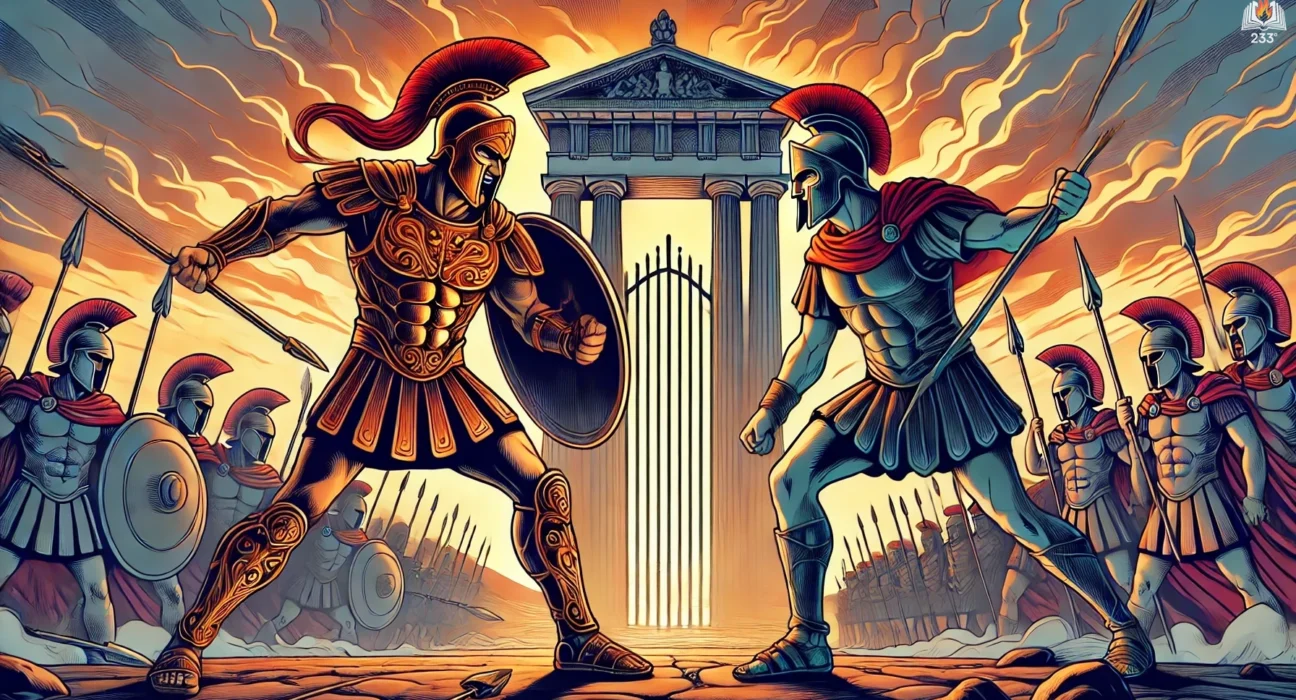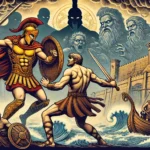The Iliad, attributed to the ancient Greek poet Homer, is one of the oldest and most influential works in Western literature, traditionally dated to the 8th century BC. Set during the Trojan War, it focuses on a few critical weeks during the tenth year of the war, chronicling the wrath of Achilles and the consequences that unfold from his anger. The poem explores themes of heroism, honor, fate, and the destructive nature of war, framed within a mythic battle between the Achaeans (Greeks) and Trojans.
Plot Summary
The war between the Achaeans and the Trojans had been raging for nearly ten years when a bitter dispute erupted in the Achaean camp, igniting the fury of the greatest of their warriors, Achilles. It began when Agamemnon, the commander of the Achaean army, offended the god Apollo by refusing to return Chryseis, a Trojan captive and the daughter of Apollo’s priest. In retaliation, Apollo unleashed a plague upon the Achaeans. Under pressure, Agamemnon finally agreed to release the girl but demanded compensation for his lost prize. He claimed Briseis, a captive belonging to Achilles, the mightiest warrior of the Achaeans.
Achilles, enraged at this insult to his honor, withdrew from the war, cursing Agamemnon and vowing not to fight. Without Achilles, the Achaean forces began to falter, and their desperation grew as the Trojans, led by the noble Hector, pushed them back toward their ships. Though the gods watched from Olympus, their favor constantly shifting, none could diminish Achilles’ wrath. In his anger, he prayed to his mother, Thetis, a sea goddess, who promised to seek the intervention of Zeus to ensure the Trojans’ success, making the Achaeans suffer for Agamemnon’s arrogance.
As the war waged on, the absence of Achilles on the battlefield became painfully apparent. Hector, beloved prince of Troy and its most skilled warrior, led the Trojans with valor and strength, gaining ground with every clash. The Achaeans, on the brink of defeat, begged Achilles to return, offering him treasures and honors, but he coldly refused. His heart was hardened not only by Agamemnon’s insult but also by his growing realization of the futility of life, the fleeting nature of glory, and the inevitability of death.
The tide of war grew bloodier. The Trojans breached the Achaean defenses, threatening to burn their ships and cut off their escape. Patroclus, Achilles’ dearest companion, could not bear to see his comrades fall. He begged Achilles to let him wear his armor, hoping that the mere sight of Achilles’ famed shield would rally the Achaeans. Reluctantly, Achilles agreed but warned Patroclus not to pursue Hector too closely.
Donning Achilles’ armor, Patroclus charged into battle. His presence reinvigorated the Achaean army, and for a moment, it seemed as though the tide might turn. But Patroclus, emboldened by his success, ignored Achilles’ warning. He pressed deeper into Trojan lines, where the god Apollo struck him down, leaving him vulnerable. Hector, seeing his chance, delivered the fatal blow. As Patroclus lay dying, he foretold Hector’s own death, for Achilles would seek revenge.
When Achilles learned of Patroclus’ death, his grief and rage were boundless. The death of his friend shattered him, and in that moment, his anger shifted from Agamemnon to Hector. Overcome with guilt and sorrow, Achilles swore to avenge Patroclus by killing Hector. Thetis, hearing her son’s cries of anguish, went to the gods and procured new armor for him, forged by the god Hephaestus. Clad in this divine armor, Achilles reentered the war, unstoppable and fueled by a burning desire for vengeance.
Achilles’ return to the battlefield was like the resurgence of a deadly storm. No Trojan could stand before him, and even the river gods, disturbed by the slaughter, could not stem the tide of his wrath. The gods, too, took sides, some helping Achilles, others Hector, but nothing could change the course that had been set. Achilles was fated to confront Hector, and the two greatest warriors finally met outside the gates of Troy.
Hector, though brave and noble, was fated to die. He faced Achilles, knowing his end was near, but fought valiantly nonetheless. Achilles, driven by unrelenting fury, chased Hector around the city walls, before finally striking him down. With his dying breath, Hector begged Achilles to return his body to his family for proper burial, but Achilles, still consumed by rage, refused. He desecrated Hector’s body, dragging it behind his chariot for all to see.
Back in Troy, Hector’s death brought immeasurable sorrow to his family. His wife, Andromache, lamented the loss of her husband, knowing that their son would grow up without a father, and that Troy would soon fall. Priam, Hector’s aged father and the king of Troy, was overwhelmed with grief. Desperate to give his son a proper burial, Priam did the unthinkable. He snuck into the Achaean camp, alone, and knelt before Achilles, begging for the return of his son’s body.
Priam’s plea touched Achilles in a way nothing else had. Seeing the old king weep for his son, Achilles was reminded of his own father, and of the human cost of the war. Moved by Priam’s courage and sorrow, Achilles finally relented. He returned Hector’s body, allowing Priam to take him home for burial. For the first time since Patroclus’ death, Achilles’ heart softened, and for a moment, the cycle of rage and revenge was broken.
The war, however, was far from over. Achilles knew that his own death was near, as had been prophesied. He had achieved glory on the battlefield, but the cost had been great. The Iliad ends not with the fall of Troy, but with the funeral of Hector, the noble warrior who fought to protect his city, his family, and his people.
Main Characters
Achilles – The central figure of The Iliad, Achilles is the greatest warrior of the Achaeans. His anger at Agamemnon for taking his war prize, Briseis, sets the events of the poem into motion. He is characterized by his intense pride, sense of honor, and inner struggle between rage and reconciliation.
Agamemnon – The leader of the Achaean forces, Agamemnon’s actions ignite Achilles’ wrath. He is often portrayed as arrogant and stubborn, his leadership leading to discord among the Greeks, but he also embodies the burden of command.
Hector – The noble Trojan prince and a brilliant warrior, Hector fights to defend Troy and his family. He is a foil to Achilles, representing duty and honor as a father and husband, and his tragic death marks a pivotal moment in the poem.
Patroclus – Achilles’ close friend and companion, Patroclus is a compassionate figure whose death deeply affects Achilles and drives him back into the battle. His death is one of the emotional climaxes of the poem.
Helen – Often blamed as the cause of the Trojan War, Helen’s abduction by Paris from her husband Menelaus leads to the conflict. She represents both beauty and the destructive consequences of desire.
Priam – The aged king of Troy, Priam is a figure of great dignity and sorrow. His supplication to Achilles to return Hector’s body is one of the most moving scenes in the epic.
Theme
The Wrath of Achilles – The central theme of The Iliad is the destructive power of Achilles’ anger. His rage against Agamemnon for dishonoring him sets in motion a chain of events that lead to tragic consequences for both the Greeks and Trojans, culminating in the death of Hector and the desecration of his body.
Honor and Glory – In the world of The Iliad, personal honor and glory (or kleos) are of utmost importance. Warriors strive to achieve everlasting fame through their deeds on the battlefield. Achilles’ internal conflict is driven by his desire for glory versus his sense of personal slight.
Fate and the Gods – The concept of fate is central to the narrative, with many characters recognizing their fated deaths but choosing to face them with bravery. The gods frequently intervene in human affairs, both aiding and thwarting the actions of mortals, reflecting the belief in divine influence on human destiny.
The Tragedy of War – While The Iliad celebrates heroism and martial valor, it also reflects on the brutal costs of war. The sorrow of loss, the destruction of families, and the sense of futility are evident, especially in the poignant scenes between Hector and his family, as well as Priam’s heartbreaking plea to Achilles.
Mortality and Immortality – Throughout the epic, there is a tension between the fleeting nature of human life and the immortal fame that heroes seek. Achilles, especially, grapples with his mortality, choosing a short life filled with glory over a long but unremarkable one.
Writing Style and Tone
Homer’s style in The Iliad is marked by grandeur and formality, fitting for an epic poem that deals with the lives and deaths of great heroes. The use of epic similes, long comparisons often drawn from nature or daily life, enriches the narrative by offering deeper insights into characters’ actions or the significance of events. For instance, Achilles is compared to a lion or a destructive wildfire, emphasizing his ferocity and power.
The tone of The Iliad fluctuates between reverence for the heroic code and sorrow for the tragic consequences of that code. The formal diction and repetitive epithets (e.g., “swift-footed Achilles,” “Hector, breaker of horses”) create a sense of ritualized storytelling, appropriate for a poem that originated in oral tradition. At the same time, Homer does not shy away from depicting the horrors of war: the brutal deaths of warriors, the grief of their families, and the devastation wrought on Troy.
The emotional depth of The Iliad is another hallmark of its style. Homer captures not just the external battles but also the internal struggles of his characters. Achilles’ grief for Patroclus, Hector’s love for his family, and Priam’s sorrow over his son’s death bring a human dimension to the epic, making it not just a story of war but also of personal loss and suffering.
We hope this summary has sparked your interest and would appreciate you following Celsius 233 on social media:
There’s a treasure trove of other fascinating book summaries waiting for you. Check out our collection of stories that inspire, thrill, and provoke thought, just like this one by checking out the Book Shelf or the Library
Remember, while our summaries capture the essence, they can never replace the full experience of reading the book. If this summary intrigued you, consider diving into the complete story – buy the book and immerse yourself in the author’s original work.
If you want to request a book summary, click here.
When Saurabh is not working/watching football/reading books/traveling, you can reach him via Twitter/X, LinkedIn, or Threads
Restart reading!








